Essay on the Impact of Policies on First People Health and Practices
VerifiedAdded on 2023/06/08
|10
|2075
|114
Essay
AI Summary
This essay examines the impact of European colonization on the First People of Australia, focusing on the effects of policies on their health outcomes. It discusses the historical context of colonization, including loss of land, forced removals, and social disruption. The essay analyzes two key policies: the self-determination policy of 1972-1975 and the indigenous advancement strategy of 2004-2014. It explores how self-determination, as a fundamental human right, has empowered the First People to participate in decision-making processes regarding their health. Additionally, it highlights the indigenous advancement strategy's role in providing funding for various programs aimed at improving jobs, economic conditions, land security, education, culture, and wellbeing. The essay concludes that both policies have positively influenced the First People's health by promoting cultural safety, respect, and access to healthcare services, leading to improved health outcomes and a more equitable healthcare system. The essay emphasizes the importance of acknowledging the First People's cultural identity and fostering trustful relationships between patients and healthcare providers.
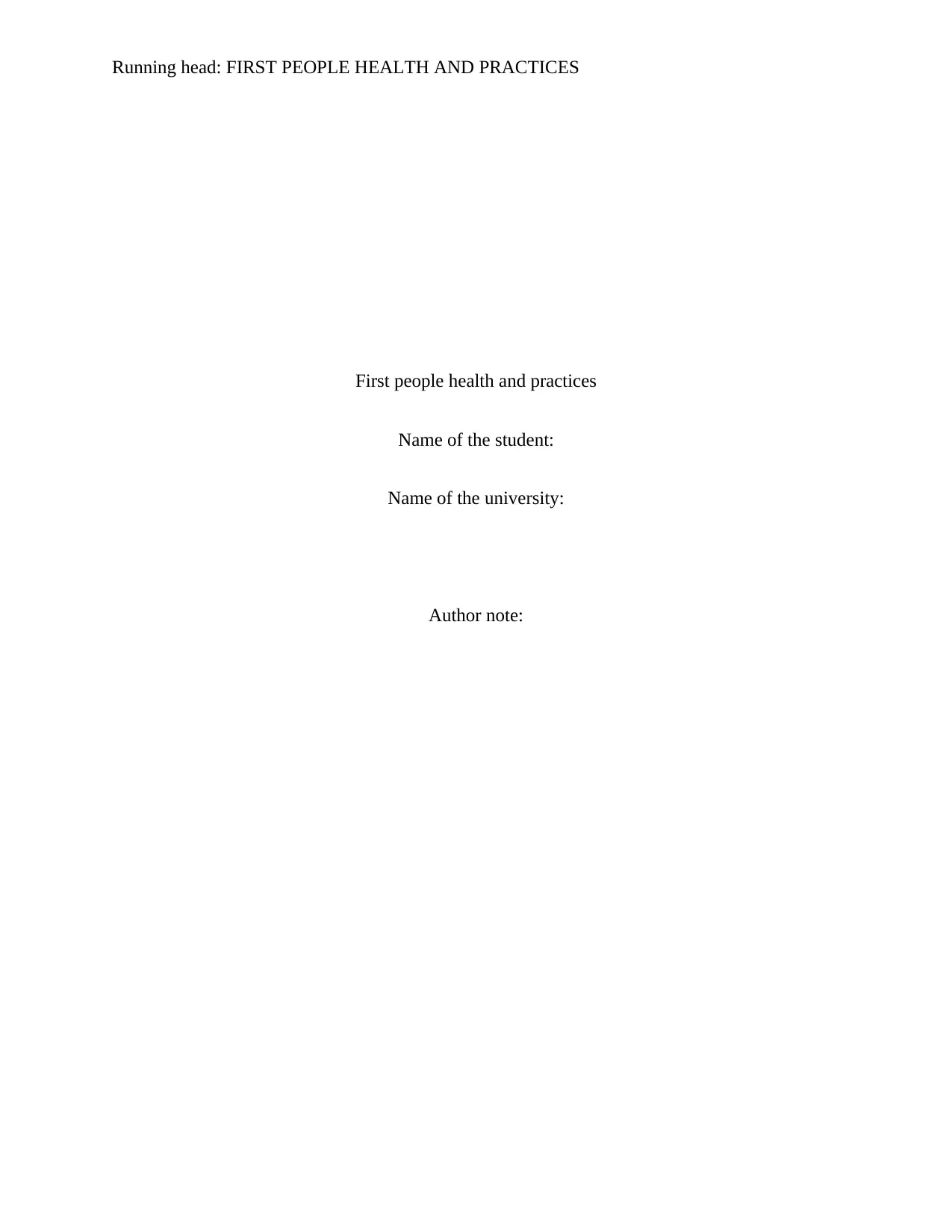
Running head: FIRST PEOPLE HEALTH AND PRACTICES
First people health and practices
Name of the student:
Name of the university:
Author note:
First people health and practices
Name of the student:
Name of the university:
Author note:
Paraphrase This Document
Need a fresh take? Get an instant paraphrase of this document with our AI Paraphraser
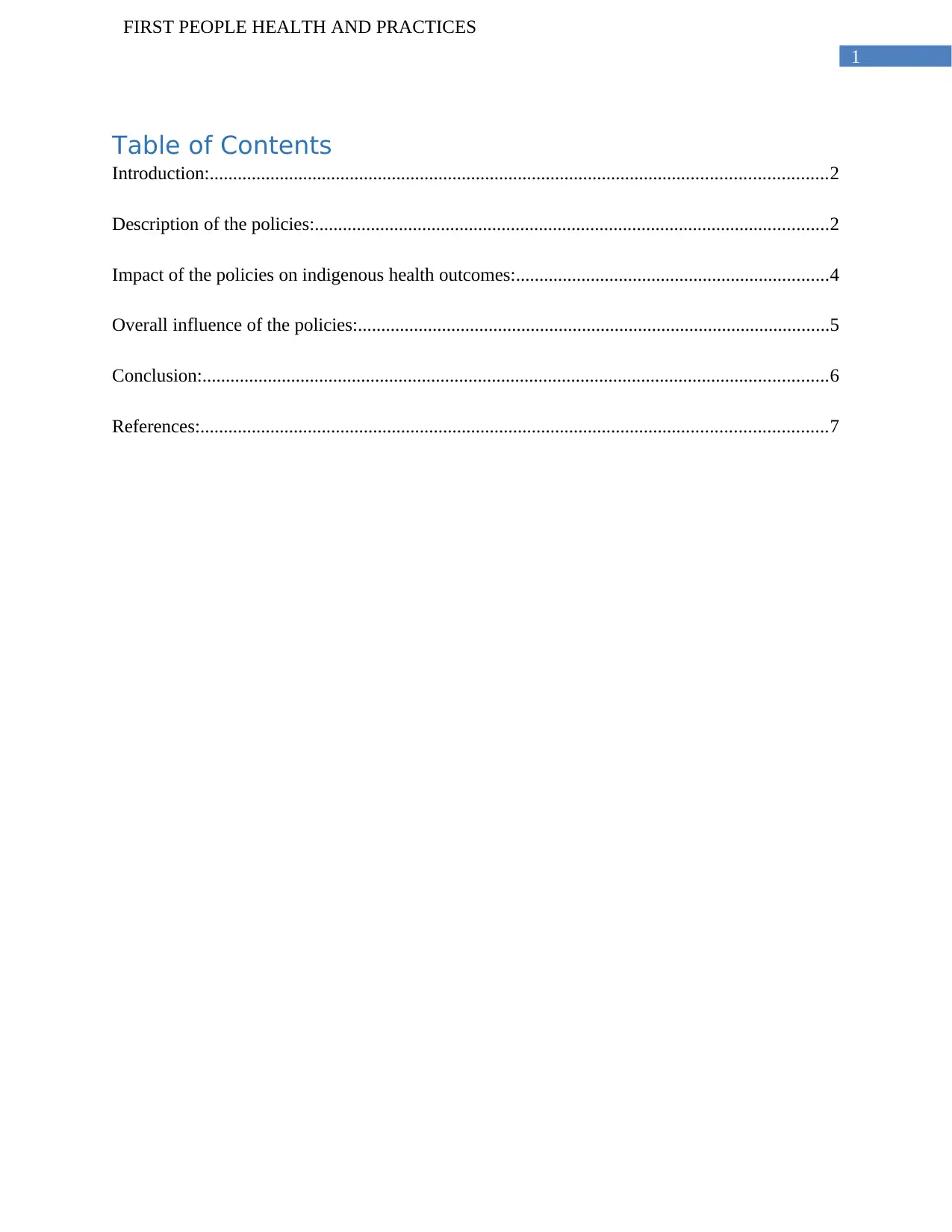
1
FIRST PEOPLE HEALTH AND PRACTICES
Table of Contents
Introduction:....................................................................................................................................2
Description of the policies:..............................................................................................................2
Impact of the policies on indigenous health outcomes:...................................................................4
Overall influence of the policies:.....................................................................................................5
Conclusion:......................................................................................................................................6
References:......................................................................................................................................7
FIRST PEOPLE HEALTH AND PRACTICES
Table of Contents
Introduction:....................................................................................................................................2
Description of the policies:..............................................................................................................2
Impact of the policies on indigenous health outcomes:...................................................................4
Overall influence of the policies:.....................................................................................................5
Conclusion:......................................................................................................................................6
References:......................................................................................................................................7
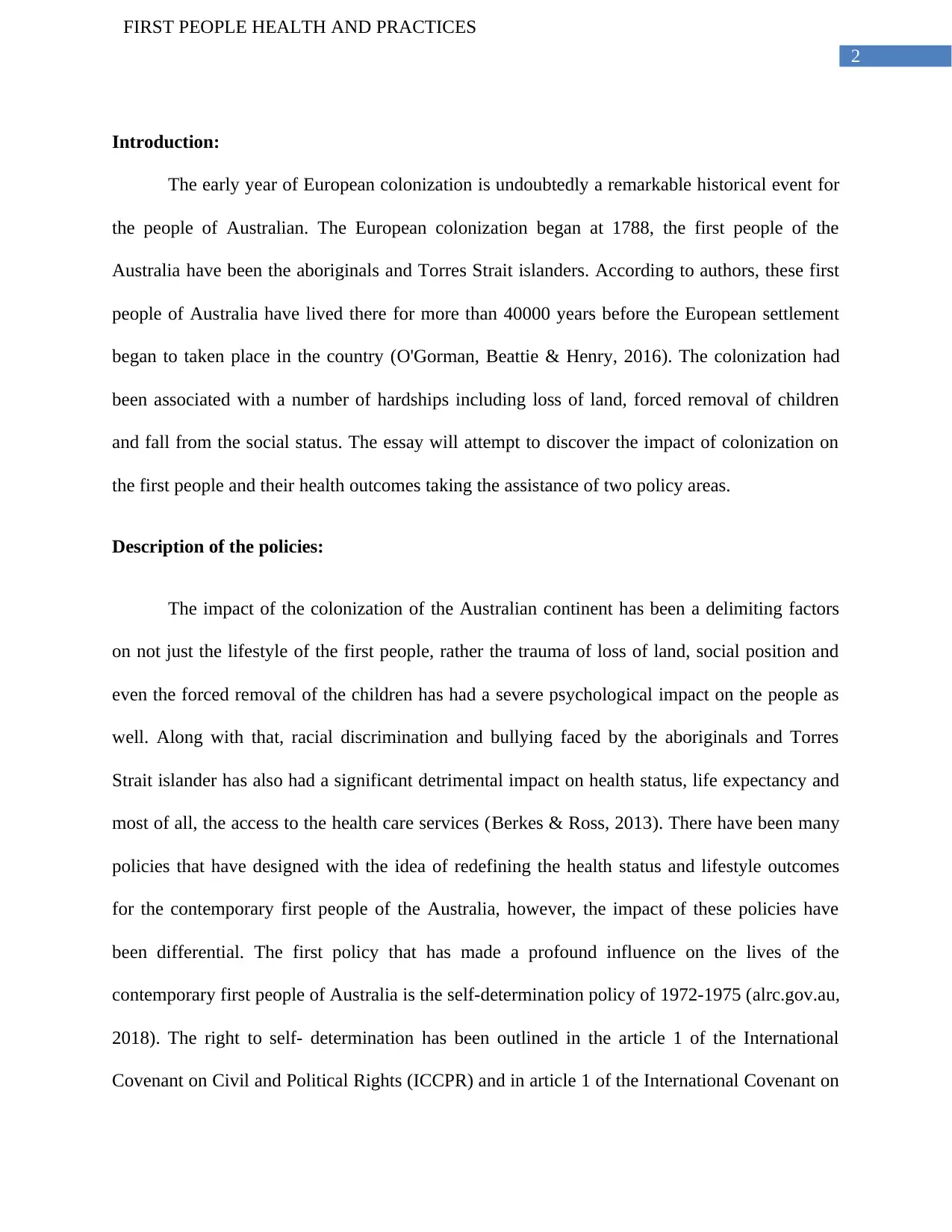
2
FIRST PEOPLE HEALTH AND PRACTICES
Introduction:
The early year of European colonization is undoubtedly a remarkable historical event for
the people of Australian. The European colonization began at 1788, the first people of the
Australia have been the aboriginals and Torres Strait islanders. According to authors, these first
people of Australia have lived there for more than 40000 years before the European settlement
began to taken place in the country (O'Gorman, Beattie & Henry, 2016). The colonization had
been associated with a number of hardships including loss of land, forced removal of children
and fall from the social status. The essay will attempt to discover the impact of colonization on
the first people and their health outcomes taking the assistance of two policy areas.
Description of the policies:
The impact of the colonization of the Australian continent has been a delimiting factors
on not just the lifestyle of the first people, rather the trauma of loss of land, social position and
even the forced removal of the children has had a severe psychological impact on the people as
well. Along with that, racial discrimination and bullying faced by the aboriginals and Torres
Strait islander has also had a significant detrimental impact on health status, life expectancy and
most of all, the access to the health care services (Berkes & Ross, 2013). There have been many
policies that have designed with the idea of redefining the health status and lifestyle outcomes
for the contemporary first people of the Australia, however, the impact of these policies have
been differential. The first policy that has made a profound influence on the lives of the
contemporary first people of Australia is the self-determination policy of 1972-1975 (alrc.gov.au,
2018). The right to self- determination has been outlined in the article 1 of the International
Covenant on Civil and Political Rights (ICCPR) and in article 1 of the International Covenant on
FIRST PEOPLE HEALTH AND PRACTICES
Introduction:
The early year of European colonization is undoubtedly a remarkable historical event for
the people of Australian. The European colonization began at 1788, the first people of the
Australia have been the aboriginals and Torres Strait islanders. According to authors, these first
people of Australia have lived there for more than 40000 years before the European settlement
began to taken place in the country (O'Gorman, Beattie & Henry, 2016). The colonization had
been associated with a number of hardships including loss of land, forced removal of children
and fall from the social status. The essay will attempt to discover the impact of colonization on
the first people and their health outcomes taking the assistance of two policy areas.
Description of the policies:
The impact of the colonization of the Australian continent has been a delimiting factors
on not just the lifestyle of the first people, rather the trauma of loss of land, social position and
even the forced removal of the children has had a severe psychological impact on the people as
well. Along with that, racial discrimination and bullying faced by the aboriginals and Torres
Strait islander has also had a significant detrimental impact on health status, life expectancy and
most of all, the access to the health care services (Berkes & Ross, 2013). There have been many
policies that have designed with the idea of redefining the health status and lifestyle outcomes
for the contemporary first people of the Australia, however, the impact of these policies have
been differential. The first policy that has made a profound influence on the lives of the
contemporary first people of Australia is the self-determination policy of 1972-1975 (alrc.gov.au,
2018). The right to self- determination has been outlined in the article 1 of the International
Covenant on Civil and Political Rights (ICCPR) and in article 1 of the International Covenant on
⊘ This is a preview!⊘
Do you want full access?
Subscribe today to unlock all pages.

Trusted by 1+ million students worldwide
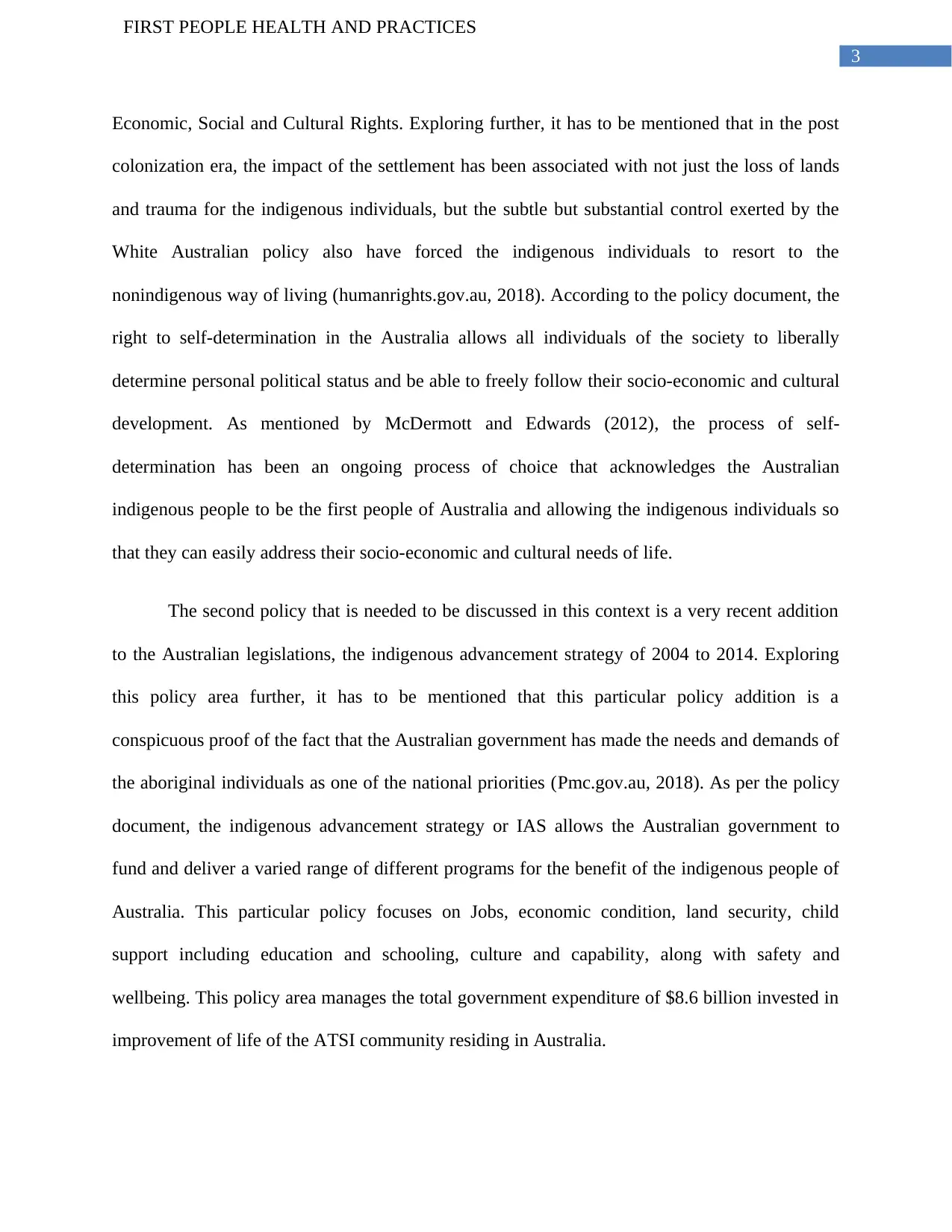
3
FIRST PEOPLE HEALTH AND PRACTICES
Economic, Social and Cultural Rights. Exploring further, it has to be mentioned that in the post
colonization era, the impact of the settlement has been associated with not just the loss of lands
and trauma for the indigenous individuals, but the subtle but substantial control exerted by the
White Australian policy also have forced the indigenous individuals to resort to the
nonindigenous way of living (humanrights.gov.au, 2018). According to the policy document, the
right to self-determination in the Australia allows all individuals of the society to liberally
determine personal political status and be able to freely follow their socio-economic and cultural
development. As mentioned by McDermott and Edwards (2012), the process of self-
determination has been an ongoing process of choice that acknowledges the Australian
indigenous people to be the first people of Australia and allowing the indigenous individuals so
that they can easily address their socio-economic and cultural needs of life.
The second policy that is needed to be discussed in this context is a very recent addition
to the Australian legislations, the indigenous advancement strategy of 2004 to 2014. Exploring
this policy area further, it has to be mentioned that this particular policy addition is a
conspicuous proof of the fact that the Australian government has made the needs and demands of
the aboriginal individuals as one of the national priorities (Pmc.gov.au, 2018). As per the policy
document, the indigenous advancement strategy or IAS allows the Australian government to
fund and deliver a varied range of different programs for the benefit of the indigenous people of
Australia. This particular policy focuses on Jobs, economic condition, land security, child
support including education and schooling, culture and capability, along with safety and
wellbeing. This policy area manages the total government expenditure of $8.6 billion invested in
improvement of life of the ATSI community residing in Australia.
FIRST PEOPLE HEALTH AND PRACTICES
Economic, Social and Cultural Rights. Exploring further, it has to be mentioned that in the post
colonization era, the impact of the settlement has been associated with not just the loss of lands
and trauma for the indigenous individuals, but the subtle but substantial control exerted by the
White Australian policy also have forced the indigenous individuals to resort to the
nonindigenous way of living (humanrights.gov.au, 2018). According to the policy document, the
right to self-determination in the Australia allows all individuals of the society to liberally
determine personal political status and be able to freely follow their socio-economic and cultural
development. As mentioned by McDermott and Edwards (2012), the process of self-
determination has been an ongoing process of choice that acknowledges the Australian
indigenous people to be the first people of Australia and allowing the indigenous individuals so
that they can easily address their socio-economic and cultural needs of life.
The second policy that is needed to be discussed in this context is a very recent addition
to the Australian legislations, the indigenous advancement strategy of 2004 to 2014. Exploring
this policy area further, it has to be mentioned that this particular policy addition is a
conspicuous proof of the fact that the Australian government has made the needs and demands of
the aboriginal individuals as one of the national priorities (Pmc.gov.au, 2018). As per the policy
document, the indigenous advancement strategy or IAS allows the Australian government to
fund and deliver a varied range of different programs for the benefit of the indigenous people of
Australia. This particular policy focuses on Jobs, economic condition, land security, child
support including education and schooling, culture and capability, along with safety and
wellbeing. This policy area manages the total government expenditure of $8.6 billion invested in
improvement of life of the ATSI community residing in Australia.
Paraphrase This Document
Need a fresh take? Get an instant paraphrase of this document with our AI Paraphraser
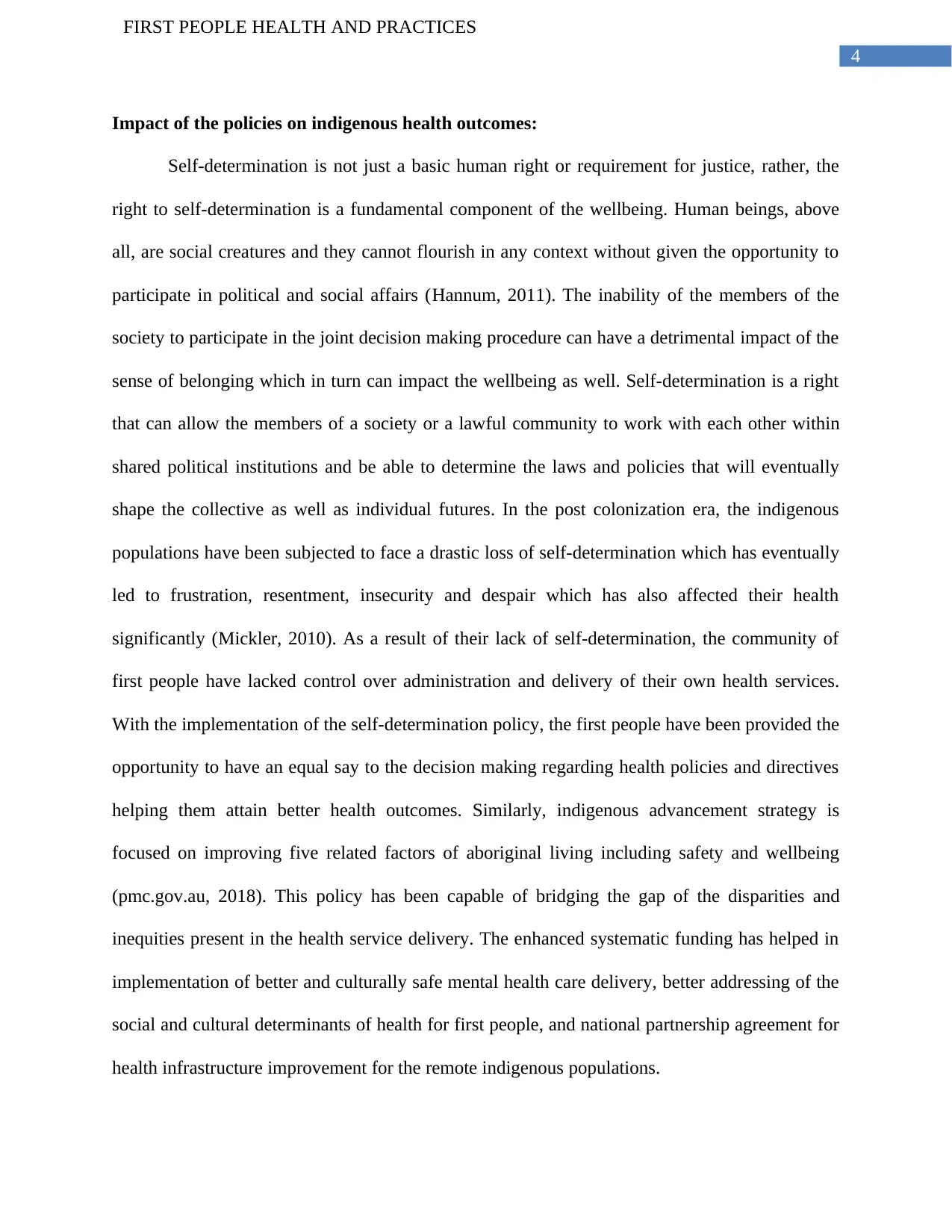
4
FIRST PEOPLE HEALTH AND PRACTICES
Impact of the policies on indigenous health outcomes:
Self-determination is not just a basic human right or requirement for justice, rather, the
right to self-determination is a fundamental component of the wellbeing. Human beings, above
all, are social creatures and they cannot flourish in any context without given the opportunity to
participate in political and social affairs (Hannum, 2011). The inability of the members of the
society to participate in the joint decision making procedure can have a detrimental impact of the
sense of belonging which in turn can impact the wellbeing as well. Self-determination is a right
that can allow the members of a society or a lawful community to work with each other within
shared political institutions and be able to determine the laws and policies that will eventually
shape the collective as well as individual futures. In the post colonization era, the indigenous
populations have been subjected to face a drastic loss of self-determination which has eventually
led to frustration, resentment, insecurity and despair which has also affected their health
significantly (Mickler, 2010). As a result of their lack of self-determination, the community of
first people have lacked control over administration and delivery of their own health services.
With the implementation of the self-determination policy, the first people have been provided the
opportunity to have an equal say to the decision making regarding health policies and directives
helping them attain better health outcomes. Similarly, indigenous advancement strategy is
focused on improving five related factors of aboriginal living including safety and wellbeing
(pmc.gov.au, 2018). This policy has been capable of bridging the gap of the disparities and
inequities present in the health service delivery. The enhanced systematic funding has helped in
implementation of better and culturally safe mental health care delivery, better addressing of the
social and cultural determinants of health for first people, and national partnership agreement for
health infrastructure improvement for the remote indigenous populations.
FIRST PEOPLE HEALTH AND PRACTICES
Impact of the policies on indigenous health outcomes:
Self-determination is not just a basic human right or requirement for justice, rather, the
right to self-determination is a fundamental component of the wellbeing. Human beings, above
all, are social creatures and they cannot flourish in any context without given the opportunity to
participate in political and social affairs (Hannum, 2011). The inability of the members of the
society to participate in the joint decision making procedure can have a detrimental impact of the
sense of belonging which in turn can impact the wellbeing as well. Self-determination is a right
that can allow the members of a society or a lawful community to work with each other within
shared political institutions and be able to determine the laws and policies that will eventually
shape the collective as well as individual futures. In the post colonization era, the indigenous
populations have been subjected to face a drastic loss of self-determination which has eventually
led to frustration, resentment, insecurity and despair which has also affected their health
significantly (Mickler, 2010). As a result of their lack of self-determination, the community of
first people have lacked control over administration and delivery of their own health services.
With the implementation of the self-determination policy, the first people have been provided the
opportunity to have an equal say to the decision making regarding health policies and directives
helping them attain better health outcomes. Similarly, indigenous advancement strategy is
focused on improving five related factors of aboriginal living including safety and wellbeing
(pmc.gov.au, 2018). This policy has been capable of bridging the gap of the disparities and
inequities present in the health service delivery. The enhanced systematic funding has helped in
implementation of better and culturally safe mental health care delivery, better addressing of the
social and cultural determinants of health for first people, and national partnership agreement for
health infrastructure improvement for the remote indigenous populations.
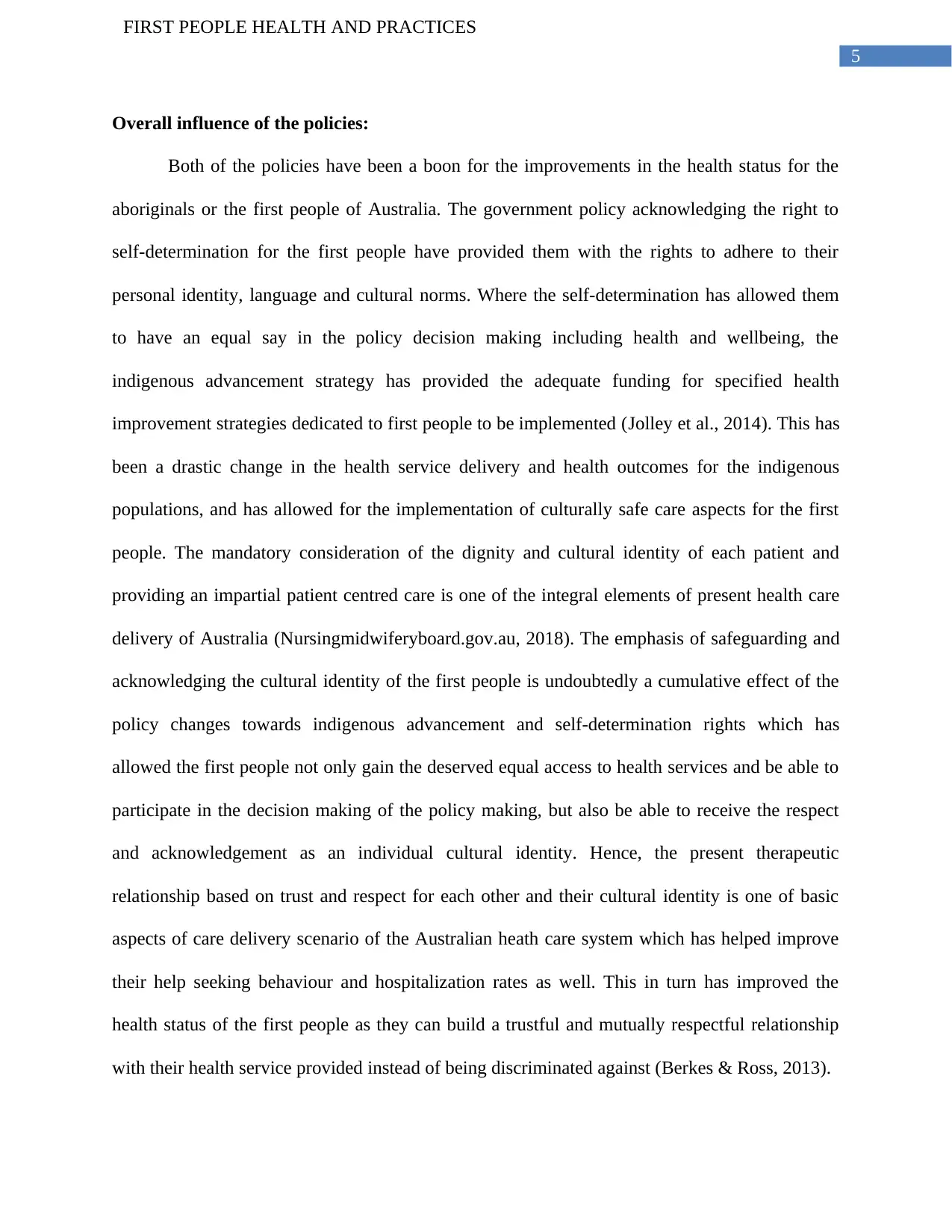
5
FIRST PEOPLE HEALTH AND PRACTICES
Overall influence of the policies:
Both of the policies have been a boon for the improvements in the health status for the
aboriginals or the first people of Australia. The government policy acknowledging the right to
self-determination for the first people have provided them with the rights to adhere to their
personal identity, language and cultural norms. Where the self-determination has allowed them
to have an equal say in the policy decision making including health and wellbeing, the
indigenous advancement strategy has provided the adequate funding for specified health
improvement strategies dedicated to first people to be implemented (Jolley et al., 2014). This has
been a drastic change in the health service delivery and health outcomes for the indigenous
populations, and has allowed for the implementation of culturally safe care aspects for the first
people. The mandatory consideration of the dignity and cultural identity of each patient and
providing an impartial patient centred care is one of the integral elements of present health care
delivery of Australia (Nursingmidwiferyboard.gov.au, 2018). The emphasis of safeguarding and
acknowledging the cultural identity of the first people is undoubtedly a cumulative effect of the
policy changes towards indigenous advancement and self-determination rights which has
allowed the first people not only gain the deserved equal access to health services and be able to
participate in the decision making of the policy making, but also be able to receive the respect
and acknowledgement as an individual cultural identity. Hence, the present therapeutic
relationship based on trust and respect for each other and their cultural identity is one of basic
aspects of care delivery scenario of the Australian heath care system which has helped improve
their help seeking behaviour and hospitalization rates as well. This in turn has improved the
health status of the first people as they can build a trustful and mutually respectful relationship
with their health service provided instead of being discriminated against (Berkes & Ross, 2013).
FIRST PEOPLE HEALTH AND PRACTICES
Overall influence of the policies:
Both of the policies have been a boon for the improvements in the health status for the
aboriginals or the first people of Australia. The government policy acknowledging the right to
self-determination for the first people have provided them with the rights to adhere to their
personal identity, language and cultural norms. Where the self-determination has allowed them
to have an equal say in the policy decision making including health and wellbeing, the
indigenous advancement strategy has provided the adequate funding for specified health
improvement strategies dedicated to first people to be implemented (Jolley et al., 2014). This has
been a drastic change in the health service delivery and health outcomes for the indigenous
populations, and has allowed for the implementation of culturally safe care aspects for the first
people. The mandatory consideration of the dignity and cultural identity of each patient and
providing an impartial patient centred care is one of the integral elements of present health care
delivery of Australia (Nursingmidwiferyboard.gov.au, 2018). The emphasis of safeguarding and
acknowledging the cultural identity of the first people is undoubtedly a cumulative effect of the
policy changes towards indigenous advancement and self-determination rights which has
allowed the first people not only gain the deserved equal access to health services and be able to
participate in the decision making of the policy making, but also be able to receive the respect
and acknowledgement as an individual cultural identity. Hence, the present therapeutic
relationship based on trust and respect for each other and their cultural identity is one of basic
aspects of care delivery scenario of the Australian heath care system which has helped improve
their help seeking behaviour and hospitalization rates as well. This in turn has improved the
health status of the first people as they can build a trustful and mutually respectful relationship
with their health service provided instead of being discriminated against (Berkes & Ross, 2013).
⊘ This is a preview!⊘
Do you want full access?
Subscribe today to unlock all pages.

Trusted by 1+ million students worldwide
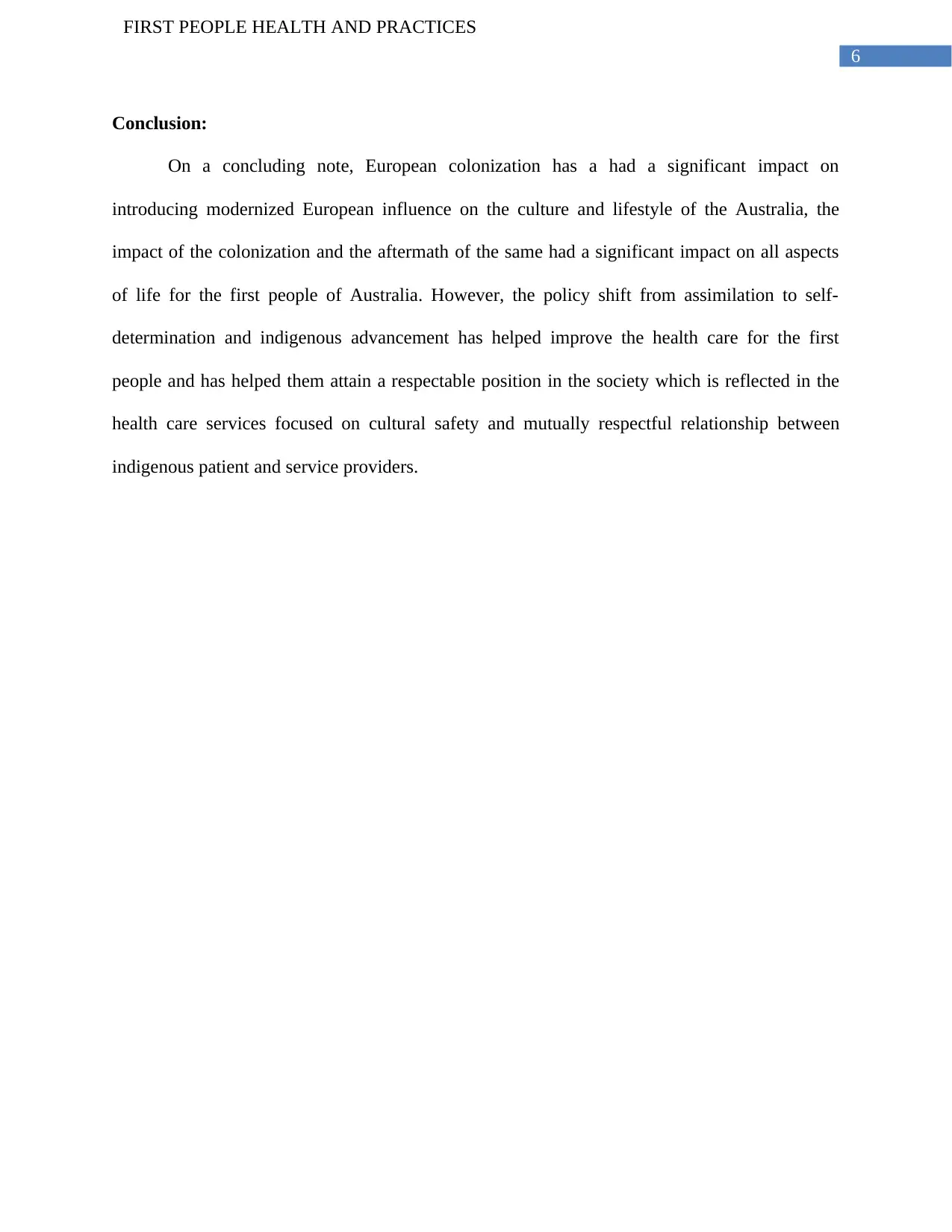
6
FIRST PEOPLE HEALTH AND PRACTICES
Conclusion:
On a concluding note, European colonization has a had a significant impact on
introducing modernized European influence on the culture and lifestyle of the Australia, the
impact of the colonization and the aftermath of the same had a significant impact on all aspects
of life for the first people of Australia. However, the policy shift from assimilation to self-
determination and indigenous advancement has helped improve the health care for the first
people and has helped them attain a respectable position in the society which is reflected in the
health care services focused on cultural safety and mutually respectful relationship between
indigenous patient and service providers.
FIRST PEOPLE HEALTH AND PRACTICES
Conclusion:
On a concluding note, European colonization has a had a significant impact on
introducing modernized European influence on the culture and lifestyle of the Australia, the
impact of the colonization and the aftermath of the same had a significant impact on all aspects
of life for the first people of Australia. However, the policy shift from assimilation to self-
determination and indigenous advancement has helped improve the health care for the first
people and has helped them attain a respectable position in the society which is reflected in the
health care services focused on cultural safety and mutually respectful relationship between
indigenous patient and service providers.
Paraphrase This Document
Need a fresh take? Get an instant paraphrase of this document with our AI Paraphraser
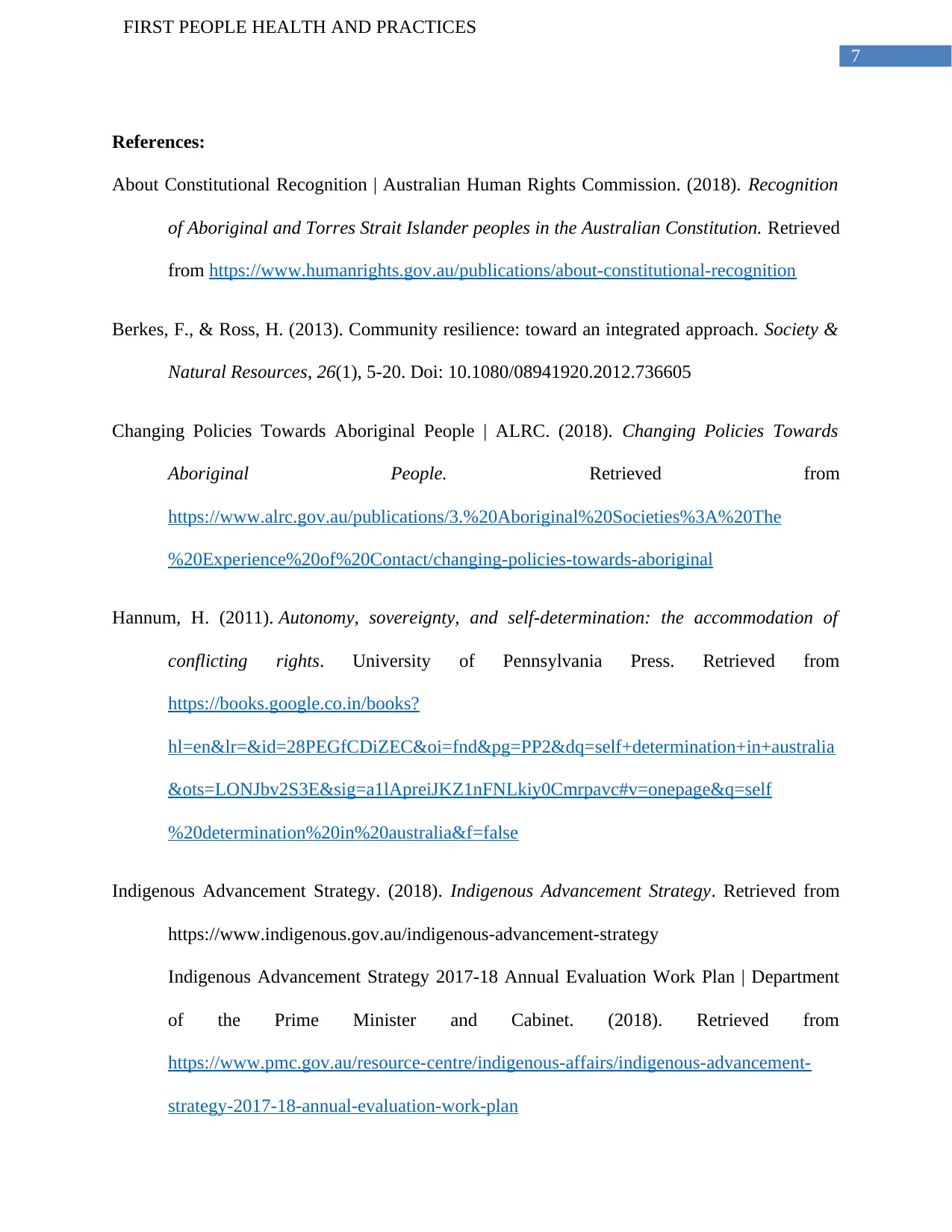
7
FIRST PEOPLE HEALTH AND PRACTICES
References:
About Constitutional Recognition | Australian Human Rights Commission. (2018). Recognition
of Aboriginal and Torres Strait Islander peoples in the Australian Constitution. Retrieved
from https://www.humanrights.gov.au/publications/about-constitutional-recognition
Berkes, F., & Ross, H. (2013). Community resilience: toward an integrated approach. Society &
Natural Resources, 26(1), 5-20. Doi: 10.1080/08941920.2012.736605
Changing Policies Towards Aboriginal People | ALRC. (2018). Changing Policies Towards
Aboriginal People. Retrieved from
https://www.alrc.gov.au/publications/3.%20Aboriginal%20Societies%3A%20The
%20Experience%20of%20Contact/changing-policies-towards-aboriginal
Hannum, H. (2011). Autonomy, sovereignty, and self-determination: the accommodation of
conflicting rights. University of Pennsylvania Press. Retrieved from
https://books.google.co.in/books?
hl=en&lr=&id=28PEGfCDiZEC&oi=fnd&pg=PP2&dq=self+determination+in+australia
&ots=LONJbv2S3E&sig=a1lApreiJKZ1nFNLkiy0Cmrpavc#v=onepage&q=self
%20determination%20in%20australia&f=false
Indigenous Advancement Strategy. (2018). Indigenous Advancement Strategy. Retrieved from
https://www.indigenous.gov.au/indigenous-advancement-strategy
Indigenous Advancement Strategy 2017-18 Annual Evaluation Work Plan | Department
of the Prime Minister and Cabinet. (2018). Retrieved from
https://www.pmc.gov.au/resource-centre/indigenous-affairs/indigenous-advancement-
strategy-2017-18-annual-evaluation-work-plan
FIRST PEOPLE HEALTH AND PRACTICES
References:
About Constitutional Recognition | Australian Human Rights Commission. (2018). Recognition
of Aboriginal and Torres Strait Islander peoples in the Australian Constitution. Retrieved
from https://www.humanrights.gov.au/publications/about-constitutional-recognition
Berkes, F., & Ross, H. (2013). Community resilience: toward an integrated approach. Society &
Natural Resources, 26(1), 5-20. Doi: 10.1080/08941920.2012.736605
Changing Policies Towards Aboriginal People | ALRC. (2018). Changing Policies Towards
Aboriginal People. Retrieved from
https://www.alrc.gov.au/publications/3.%20Aboriginal%20Societies%3A%20The
%20Experience%20of%20Contact/changing-policies-towards-aboriginal
Hannum, H. (2011). Autonomy, sovereignty, and self-determination: the accommodation of
conflicting rights. University of Pennsylvania Press. Retrieved from
https://books.google.co.in/books?
hl=en&lr=&id=28PEGfCDiZEC&oi=fnd&pg=PP2&dq=self+determination+in+australia
&ots=LONJbv2S3E&sig=a1lApreiJKZ1nFNLkiy0Cmrpavc#v=onepage&q=self
%20determination%20in%20australia&f=false
Indigenous Advancement Strategy. (2018). Indigenous Advancement Strategy. Retrieved from
https://www.indigenous.gov.au/indigenous-advancement-strategy
Indigenous Advancement Strategy 2017-18 Annual Evaluation Work Plan | Department
of the Prime Minister and Cabinet. (2018). Retrieved from
https://www.pmc.gov.au/resource-centre/indigenous-affairs/indigenous-advancement-
strategy-2017-18-annual-evaluation-work-plan
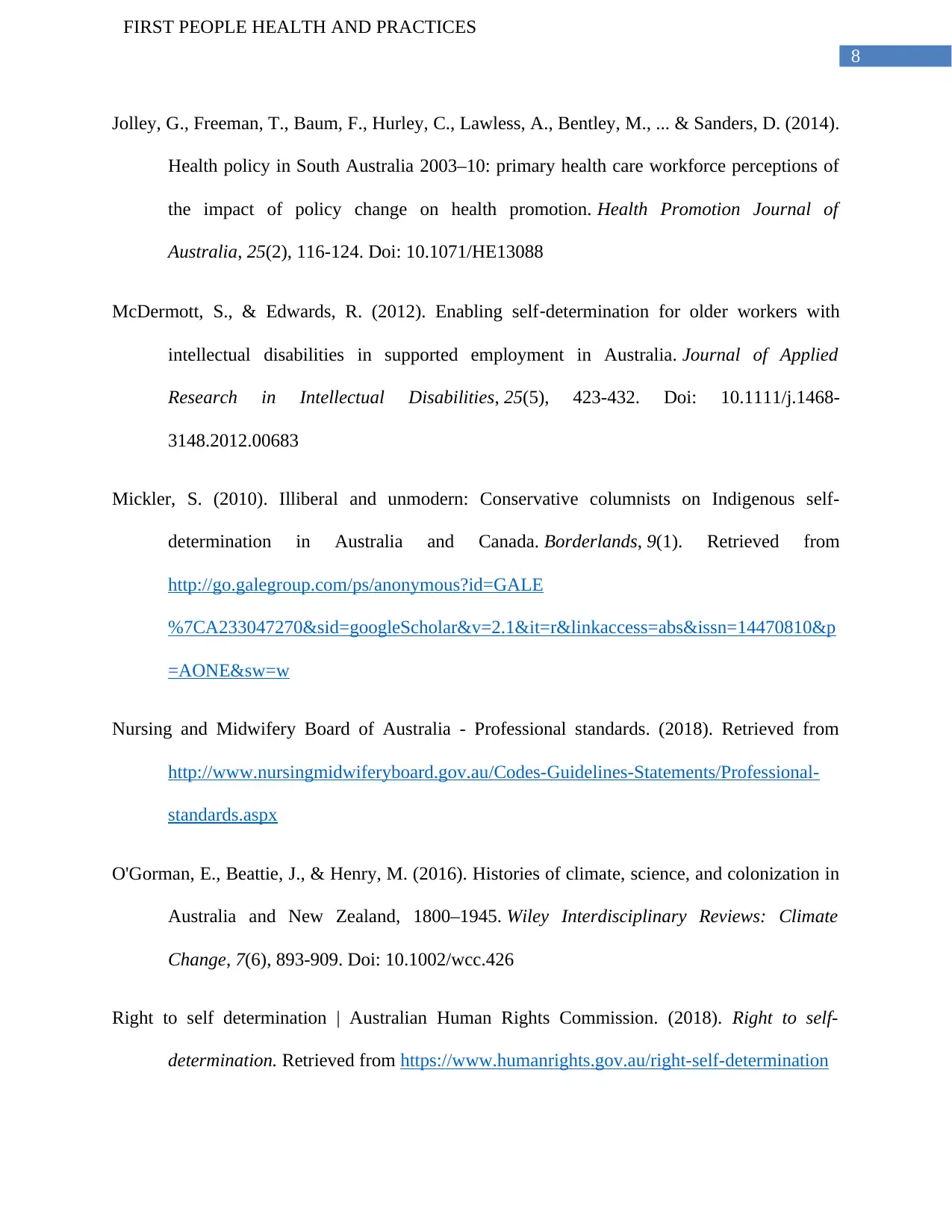
8
FIRST PEOPLE HEALTH AND PRACTICES
Jolley, G., Freeman, T., Baum, F., Hurley, C., Lawless, A., Bentley, M., ... & Sanders, D. (2014).
Health policy in South Australia 2003–10: primary health care workforce perceptions of
the impact of policy change on health promotion. Health Promotion Journal of
Australia, 25(2), 116-124. Doi: 10.1071/HE13088
McDermott, S., & Edwards, R. (2012). Enabling self‐determination for older workers with
intellectual disabilities in supported employment in Australia. Journal of Applied
Research in Intellectual Disabilities, 25(5), 423-432. Doi: 10.1111/j.1468-
3148.2012.00683
Mickler, S. (2010). Illiberal and unmodern: Conservative columnists on Indigenous self-
determination in Australia and Canada. Borderlands, 9(1). Retrieved from
http://go.galegroup.com/ps/anonymous?id=GALE
%7CA233047270&sid=googleScholar&v=2.1&it=r&linkaccess=abs&issn=14470810&p
=AONE&sw=w
Nursing and Midwifery Board of Australia - Professional standards. (2018). Retrieved from
http://www.nursingmidwiferyboard.gov.au/Codes-Guidelines-Statements/Professional-
standards.aspx
O'Gorman, E., Beattie, J., & Henry, M. (2016). Histories of climate, science, and colonization in
Australia and New Zealand, 1800–1945. Wiley Interdisciplinary Reviews: Climate
Change, 7(6), 893-909. Doi: 10.1002/wcc.426
Right to self determination | Australian Human Rights Commission. (2018). Right to self-
determination. Retrieved from https://www.humanrights.gov.au/right-self-determination
FIRST PEOPLE HEALTH AND PRACTICES
Jolley, G., Freeman, T., Baum, F., Hurley, C., Lawless, A., Bentley, M., ... & Sanders, D. (2014).
Health policy in South Australia 2003–10: primary health care workforce perceptions of
the impact of policy change on health promotion. Health Promotion Journal of
Australia, 25(2), 116-124. Doi: 10.1071/HE13088
McDermott, S., & Edwards, R. (2012). Enabling self‐determination for older workers with
intellectual disabilities in supported employment in Australia. Journal of Applied
Research in Intellectual Disabilities, 25(5), 423-432. Doi: 10.1111/j.1468-
3148.2012.00683
Mickler, S. (2010). Illiberal and unmodern: Conservative columnists on Indigenous self-
determination in Australia and Canada. Borderlands, 9(1). Retrieved from
http://go.galegroup.com/ps/anonymous?id=GALE
%7CA233047270&sid=googleScholar&v=2.1&it=r&linkaccess=abs&issn=14470810&p
=AONE&sw=w
Nursing and Midwifery Board of Australia - Professional standards. (2018). Retrieved from
http://www.nursingmidwiferyboard.gov.au/Codes-Guidelines-Statements/Professional-
standards.aspx
O'Gorman, E., Beattie, J., & Henry, M. (2016). Histories of climate, science, and colonization in
Australia and New Zealand, 1800–1945. Wiley Interdisciplinary Reviews: Climate
Change, 7(6), 893-909. Doi: 10.1002/wcc.426
Right to self determination | Australian Human Rights Commission. (2018). Right to self-
determination. Retrieved from https://www.humanrights.gov.au/right-self-determination
⊘ This is a preview!⊘
Do you want full access?
Subscribe today to unlock all pages.

Trusted by 1+ million students worldwide

9
FIRST PEOPLE HEALTH AND PRACTICES
FIRST PEOPLE HEALTH AND PRACTICES
1 out of 10
Related Documents
Your All-in-One AI-Powered Toolkit for Academic Success.
+13062052269
info@desklib.com
Available 24*7 on WhatsApp / Email
![[object Object]](/_next/static/media/star-bottom.7253800d.svg)
Unlock your academic potential
Copyright © 2020–2025 A2Z Services. All Rights Reserved. Developed and managed by ZUCOL.





